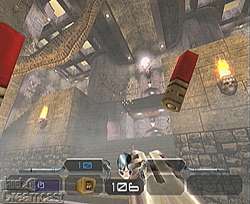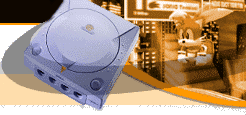Graphics

Is Quake III Arena looks pretty darn fabulous on the Dreamcast. Check out those flying shells! |
Graphics can make or break a game, especially a first-person shooter. After all, you want whatever you happen to be killing to look as detailed as possible, while avoiding in-game stutters. When it was announced that Q3A was coming to Dreamcast, many wondered how the developers would get the engine running at all -- let alone at a decent speed -- on Sega's white box. However, most critics were silenced when they saw the finished product - Q3A pushed back the boundaries of what many thought could be done with the Dreamcast. Dynamic colored lighting, plenty of detail and lovely curved surfaces were to be found throughout the game, to the delight of gamers. There was, however, a slight disadvantage. While the Dreamcast-only levels ran at a smooth 35-40 frames per second, some of the original maps developed by Id Software became sluggish with three or four players battling it out together.
The Unreal engine was running on Dreamcast devkits as soon as they were available. And due to the fact that the original Unreal had been in development for the PSone, shooter fans weren't surprised to hear that Unreal's multiplayer-oriented sequel, Unreal Tournament was in development for Sega's Dreamcast. Early reports from the Unreal camp were promising, with the developers promising a higher player limit than Q3A while running at a steady 40 frames per second. However, as with the PC version, UT lacked some of the graphical achievements that the Q3A engine had made possible. While the UT engine pumped out polygons at a respectable 30-40 frames per second on most maps, some larger levels such as CTF-Face with six or more players slowed gameplay to a pitiful 20 frames per second (and sometimes even less).
Sound
While not quite as much so as graphics, sound is a very important aspect of any game. The Dreamcast version of UT uses the same background tracks as the PC version. Not that that's a criticism -- this music provided either more fuel for the carnage, or a genuine sense of atmosphere. However, some tracks had to be shortened due to the less-powerful nature of the Dreamcast. While this shouldn't have been a problem, this made some tracks end rather suddenly and unexpectedly (the DM-Deck16 backing music being a classic example). This probably wouldn't be noticed by those who haven't played the PC version, but for people like myself who played the original to death, it's painstakingly obvious. UT's sound effects are what anyone would expect from a first-person shooter. They're the standard gunshots, explosions and the like that we're used to. The sound quality has decreased slightly from the original, but it's hardly noticeable. One unique feature of UT that has remained is its voice binds. These allow you to send commands to your teammates (or taunts to your foes) with the press of a single key - nice.
While all of Q3A's sound effects have made the transaction from PC to Dreamcast, the game's music has changed... not very much, but it's changed. It's what could be described as "more of the same". While this is neither good nor bad, it's worth a mention. Like several of UT's tracks, Q3A's background tunes help to fuel this more deathmatch-oriented game. The sound effects are present and correct, too. Rockets still hit foes with a satisfying "boom", the machine gun sounds just as puny as ever, and enemies die with the same grunts that they always have done.
Control
If you can't control a game well, then why play it? Thankfully, both Unreal Tournament and Quake III Arena support the Dreamcast keyboard and mouse, allowing DC gamers to have a near-identical gaming experience to their PC-owning cousins. Both games give reasonably good performance with the stnadard DC controller, however UT stands out as the best to use if you're lacking a keyboard and mouse. Both UT and Q3A also allow you to customize your chosen controller to your hearts content, however Q3A allows you to customize all three mouse buttons, giving it a slight advantage. In UT, mouse users will have to settle for one of a few different control schemes possibly alienating some players of the PC versions. (Editors's Note: I would be included in this bunch. - digitaltaco)
Gameplay

Random battle in Unreal Tournament has some pretty sweet textures. Check out this stained glass! |
Gameplay is often the most complex aspect of a game to comment on. While both games are first-person shooters, they very in many different ways. UT is definitely the more teamplay-oriented of the two games. While Q3A simply allows you to battle against each other without a second thought, UT offers the gamer much more variety. It has ten weapons as opposed to the nine, and each of these has a secondary fire mode. This means that UT provides more than twice as many ways to dispose of your foes. But, Q3A is by far the better deathmatcher here. Everything about this game is based around fast action, and the backing music helps to fuel this action. UT, however, aims to make the gamer think and outwit their opponent before blowing them to smithereens.
That said, compared to UT, Q3A's CTF (capture the flag) mode is very poor indeed. It's basically "deathmatch with two flags", and the game's below-average AI doesn't help matters. Two other major flaws in Q3A include its four-player limit and lack of levels - in some maps you'll be struggling to find opponents to frag. UT's eight-player limit allows for a better CTF experience, with players performing different tasks all over the map. Overall, UT comes top on teamplay, but Q3A remains to be the deathmatch daddy.
Online Play
Want to frag other players online? Both Q3A and UT allow you to do this through Seganet! Both games support the broadband adapter, which gives you very low ping times, meaning less delay and faster action. If you've got a BBA, then you can expect the online experience to be very much the same as the offline one. UT's higher player limit gives it a slight advantage here, but in this area neither game really stands out as superior to the other. If you're in Europe, however, you will be forced to miss out on UT's online mode, as the European version of the game lacks online support.

